Stories
Farzana’s Story
Less than two years ago, a young Paralympian, Afghan woman named Farzana arrived alone in the United States. Kabul had fallen to the Taliban.
She never imagined she would end up here, far removed from the home she knew and a family she loved. Now alone in a foreign country, she was unable to speak the language, understand the culture, or communicate her needs.
Fast forward one year later to World Relief’s Spotlight Event. This same young woman sits confidently in front of an intimate crowd at a coffee shop and openly shares her experience – with her own English words. Here, Farzana shares what it was like to flee Afghanistan, adjust to a new life in a foreign country, and the one thing that made a huge difference.
Her Life Before
Farzana never imagined a day when she would be forced to flee her home. It was difficult for anyone to believe that 20 years of progress in Afghanistan could revert back to its former state of Taliban rule and oppression.
After all, life had been good for Farzana. Her days were filled with things that mattered most to her. She was grateful for the support of her family – which included her parents, three sisters, and one brother. She cherished the laughter and celebratory times she enjoyed with her extended family. And she thrived in her passion to play basketball as a Paralympian athlete.
The Taliban Effect
When the Taliban took over in August 2021, life as Farzana knew it was abruptly altered. For her safety, she was encouraged to leave home and her family along with it.
The familiarities of every day life – working, practicing with her teammates, spending time with her family – were replaced with the unknown. She now resided in a world that no longer made sense to her.
Struggling to navigate a foreign culture, an unfamiliar language, and confusing systems, Farzana faced her biggest challenge: how could she live here alone?
The Paralympian Experience
On the surface, Farzana’s disability as a female Afghan might have been viewed as a disadvantage. Yet Farzana fought to be resilient, tenacious and independent. Something she would later need in her unexpected experience as an immigrant.
What helped shape these qualities within her? The unconditional support of her family and others as she competitively trained on the basketball court as a Paralympian.
The One Difference
Farzana might have felt alone, but she wasn’t alone. She ended up with another extended family in the United States that made a world of difference. The volunteers and staff at World Relief helped Farzana create a safe space to live. They supported her. Practiced English with her. Encouraged her to push past her challenges. They helped her accomplish her goals and continue to journey with her today.
And she has always had a remarkable friend walking right alongside her.
Her New Life
Farzana now lives independently in her own place. She is working, attending school, and thriving in her use of English. And she is back on the courts, living out her passion for basketball once again.
Her biggest dream? To be reunited with her family and to inspire other girls with disabilities that they too can accomplish their goals.
The Part You Play to Impact the Life of an Immigrant or Refugee
Immigrants and refugees in vulnerable situations are trying to navigate a foreign world without a safe space to do so. Volunteers at World Relief help provide this safe space by journeying with them and together, overcoming the barriers that can impede their success. You too can play an essential role in helping our new neighbors rebuild their lives by becoming a volunteer.
Catch Farzana’s whole story at the Spotlight event.
Watch other stories of transformation on World Relief Chicagoland’s YouTube channel!
More like this:
New Opportunity in the U.S.: Jenny’s Story
Hope in the Tension of Waiting
Dear Church Leaders,
The peace of Christ to you! Advent is in full swing—and Christmas is around the corner. What feelings does this season stir in you and your congregation—excitement, sorrow, joy, stress?
Rhythms change a bit this time of year, freeing many of us up to gather with loved ones. Personally, I am really hoping for both good connection and down time. I also recognize that for many, broken relationships highlight that all is not right. This season actually hurts.
Refugees also know the pain of separation from community rhythms—when the comfort of being with loved ones at home is replaced by only memories and tears. “Will my life ever feel normal again?” so many wonder as they work to adjust to a new land.
Until God’s promise of the new heavens and earth is made complete, and all the complexities of our broken relationships and systems are healed, our world waits in this tension. No matter how much technological and social progress we make, there lingers a shared sense that not all has not been made fully right yet.
We wait in tension—we qavah—for wholeness.
Living on the margins of society, Mary knew this tension well. Picture her in your mind—the humble, Jewish adolescent, displaced and pregnant, her family heavily taxed by Caesar Augustus, the self-declared son of god. Between the Old and New Testaments, Yahweh had been silent for 400 years. In Mary’s day, all did not feel right.
Her song proclaims a bold hope amidst this tension of waiting: At last! He has come to save us from our brokenness—and to defeat the powers that oppress us. Her voice cries out: Finally! Hope for the humble, the poor and the forgotten of His people. At last, the long-awaited sign! Yahweh’s ancient promise to Israel of salvation and justice is coming true.
Like Mary and our ancestors of faith,we may not know exactly how God will complete this work—and actually, we may not have evidence that circumstances will get better before they get worse. At times, we look around at our churches and communities, stuck in complexity and crisis we cannot fix. But like the prophets declared, our hope is rooted—not in the state of the world or our odds at progress—but in the very person of Jesus Christ. His faithfulness in the past gives us hope for the future He has promised. That one day at last, He will finally rescue us—and the whole creation—from decay and death.
As we wait for King Jesus to come again, we can lean deeply into hope that is rooted—not in summoned optimism or holiday cheer—but in the very character of God who makes good on His promises.
This hope gifted to Mary and to our forefathers is the same hope given today to displaced refugees—and to you and me. Praise the Lord—we need it now as much as ever.
During Advent, I invite you to reflect: who do you know that needs to be invited afresh into this bold, enduring hope?
May the Lord infuse your heart with it this day,
J. Mark Bowers
for all of us at World Relief
Feeling inspired to get involved? See what you can donate to create safe, welcoming homes for refugees – and above all, hope.

J. Mark Bowers is Sr. Training Advisor at World Relief, building our capacity to help churches become places of welcome wherever they are.
Christmas in a Myanmar Village
Sweet December
During the month of December, a deep Christmas spirit erupts to fill every corner of Hanna Niang’s village. The crisp winter weather is a joyous gift after months of heat and rain, and at night, Christmas decorations twinkle in harmony with the sounds of youth caroling from door to door.
Niang’s village lies near the Chin State. The Chin State is home to many communities of Chin people, and you can often find an entirely different language or culture in just the next town over. Niang herself is Zo Chin.
The holiday season begins with a celebration called “Sweet December,” celebrated on December 1st. For Niang’s family, it’s a time to gift and eat sweets, gather at church for worship, and follow the program until the youth take over with activities or lighthearted pranks.
“There’s always a comedian, you know… they might perform, tell jokes. One time I remember the youth asked the pastor to dress in a silly way he never dressed before. We always have a lot of fun,” she says.
The day ends with a dinner of milk tea and sticky rice.
Preparations
According to Niang, celebrating Christmas in the village is much more fun than it is in the city. The village has unlimited space for locals to play music “as loudly as [they] want.” Chin State Christians account for 85% of the 6% of Christians living in Myanmar, so there are plenty of people to join in the celebration (although Buddhists and Muslims are always invited to celebrate in their “own way”).
In the city, there’s less space, more neighbors concerned about volume, and it’s hot.
Christmas is celebrated outside. The pastor, elders, youth, and the women’s group of the church begin planning months in advance. Before Christmas Day, the church will construct a large bamboo or wooden frame to serve as a pavilion. Although there’s rarely more than a dusting of snow, dried rice leaves are then used to line the floor, ceiling, and walls, which may also be reinforced with a tarp to prevent eager children from jumping through.
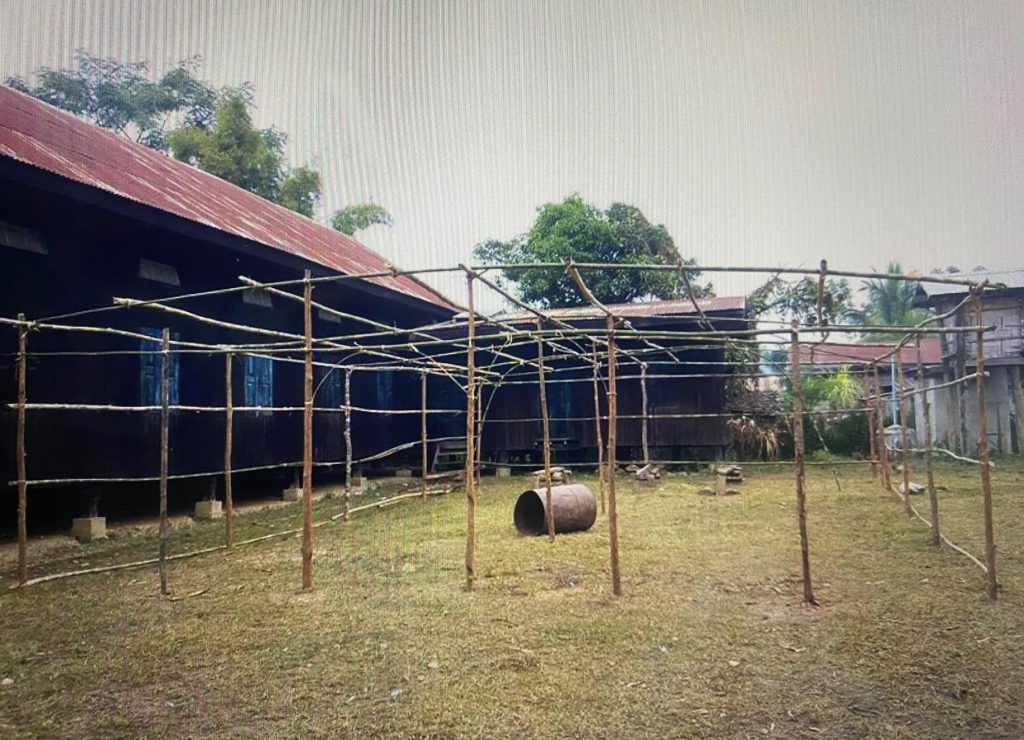
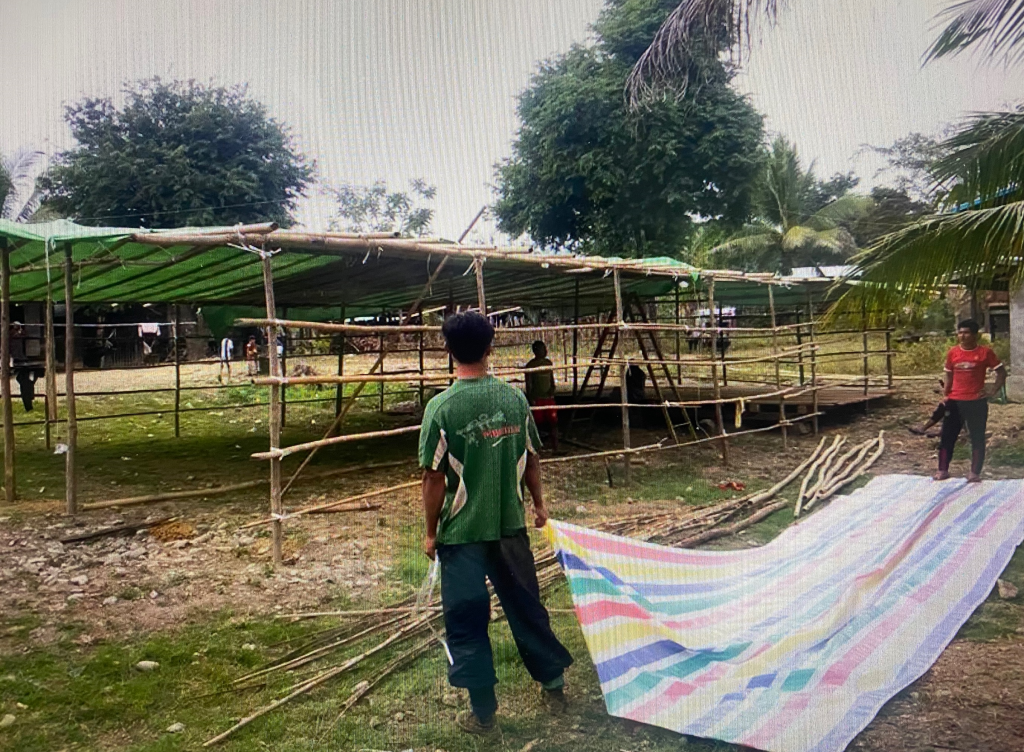
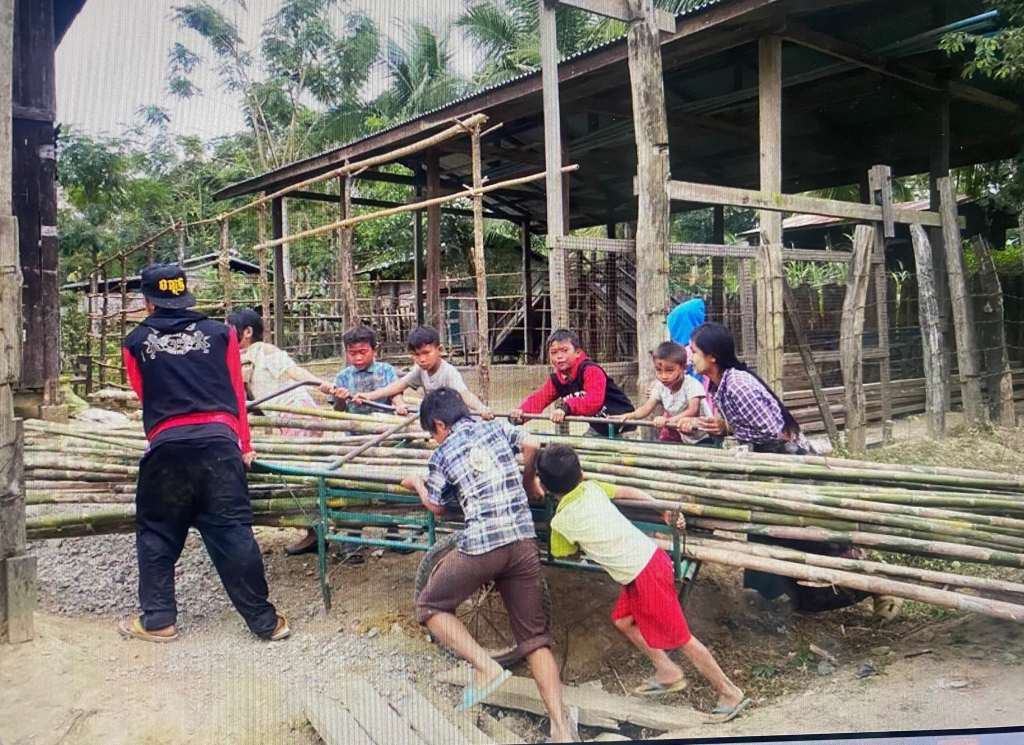
No table is long enough to seat every person, so the church prepares a long wooden buffet where everyone sits and shares their meal. Both are temporary structures which are burned for easy takedown after the event.
Christmas Day
One long road lined with houses stretches the village. On Christmas Day, the houses become shops. Each home offers something different, from traditional food like porridge to chips that are sour, spicy, or sweet. Sometimes owners already have permanent stores in front of their house. Those who want to sell but don’t have a house by the road ask a relative to sell on their property.
“Imagine Avenue of the Cities,” Niang says, “one road with shops that everyone walks on. There’s a lot of conversation about ‘what are you going to do, what are you going to sell.’”
“And if you’re the relative, you might get to eat some of what is being sold,” she gladly adds.
At the event, everyone is treated to both lunch and dinner. Families most often bring their own rice to accompany their food and milk tea. Children often roll their rice into a ball to carry while they play hide and seek. People coming from the Chin State don’t grow rice, so they bring corn instead.
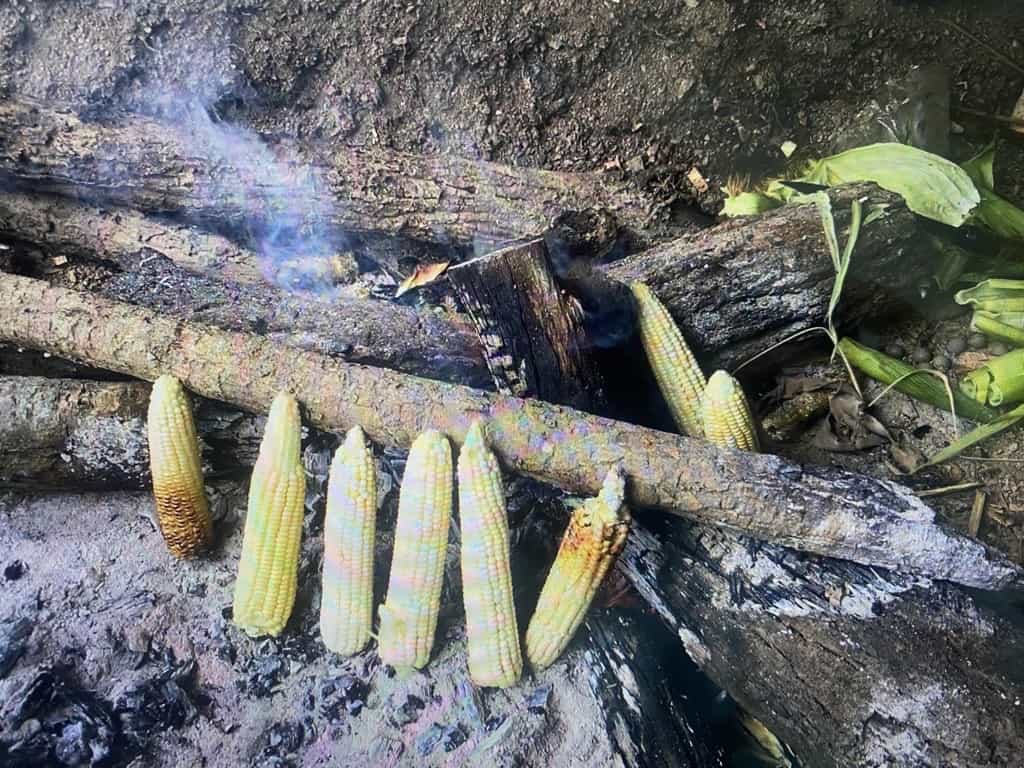

The most famous dish is made from sticky rice cooked in a bamboo stick and grilled on a barbecue.
“Everyone has a different name for it, but Zo Chin call it ‘Bom Dan.’ We have black and brown bamboo, some people will put filling, like red beans,” Niang says.
Between meals, there’s dancing, singing, games, and worship. Lively conversation fills the air from all directions. Everyone is excited to come together, celebrate, and share blessings with one another – not as individuals, but as a community.
From Myanmar to the U.S.
Church members most often choose to divide event costs among themselves, even if they are overseas and not able to join the celebration. Depending on the church’s needs, members may donate drinks, rice, or meat like pork, cow, and ox.
In 2019, Niang’s family took over the costs for their church’s celebration in Myanmar despite living in the States.
U.S. culture is a whirlwind of future tense, and it comes as a shock to those experiencing their first Christmas after resettlement. With everyone thinking hours, days, even weeks ahead, lively celebration is replaced with small, formal service; Christmas is celebrated with immediate family rather than the community as one. Few have time to stay and chat, let alone celebrate through the night.
“When we celebrate, we celebrate as a community, with community.” Niang says. “Here, we’re thinking about work instead of celebrating. And another thing is gifts.”
Gift giving isn’t nearly as central in Myanmar as it is in the States. Santa Clause doesn’t visit Niang’s village. Instead, it’s customary to give gifts like money or clothing to church elders or others involved in the church. Parents will buy their children new clothes, typically the only clothes they receive for the year. Christmas attire is an early decision and a special outfit is reserved early in the year, often in red, white, or green.
“My people are similar to Native Americans,” she says. Sometimes they dance around the fire to the beat of a hand drum or put on traditional clothes, although they’re not as “showy” as they used to be. And although younger people will sometimes indulge in homemade rice wine before the event, they respect the church’s boundaries.
“We celebrate Christmas as Christians, but we always keep tradition,” she says.
Niang’s church hasn’t celebrated Christmas for three years because of COVID. She’s not sure if they will celebrate this year, but she’s hopeful. Meanwhile, she suggests that others in the U.S. slow down, stay present, and “enjoy life” this Christmas season.
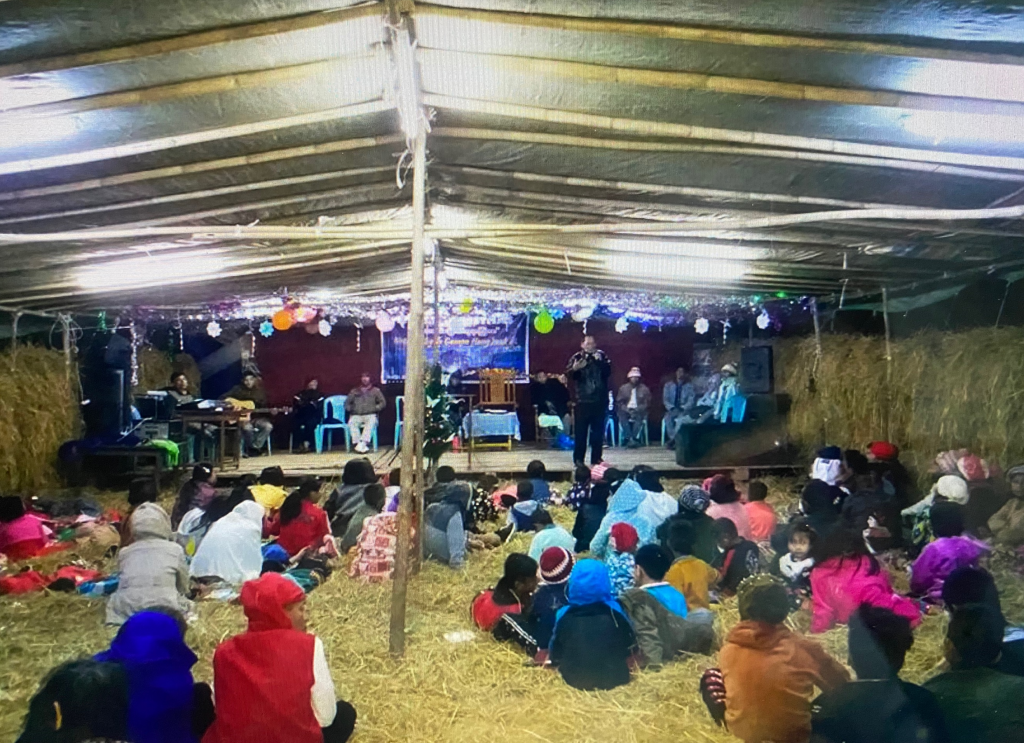
Merry Christmas, ပျော်ရွှင်သောခရစ္စမတ်ဖြစ်ပါစေ
Want to help a family experiencing their first Christmas in the U.S.? See what you can donate, or, consider making a financial gift:

Erica Parrigin manages grant writing and communications at World Relief Quad Cities. She graduated from Western Illinois University with a BA in English in 2020. She believes that stories are powerful, and that learning to empathize with other perspectives is the key to making a difference.
Refugee Employees Celebrate 10 Years at XPAC
“Where am I going to find work?” is a question that weighs heavy in the minds of refugee arrivals. Over the last 10 years, XPAC has led hundreds to gain peace of mind and self-sufficiency through employment.
The decision to become an employment partner with World Relief Quad Cities came in 2011.
“The relationship . . . has continually grown and exceeded our wildest imagination,” said Denise Kelly, Director of Human Resources at XPAC. “It’s such a success.”
XPAC (originally Export Packaging Company) began in 1974 as a small pallet and crating company with about 50 employees. Today, XPAC staffs around 1300 employees, specializing in customized logistics and supply chain management solutions.
Many are current or former refugees. As their English improves and they adjust to the workplace, more opportunities become available.
“We have several refugees who have been promoted, even multiple times, all the way to supervisory positions. They are eager to succeed and lead,” Denise said.
When other members of the refugee community see the success that current ESL (English as a Second Language) employees have, it inspires them to push through their adjustment period. This year, seven employees celebrated 10 years with XPAC, in addition to the five who celebrated their 11 years in 2021.
It’s a special thing to stay with a first job in a new country, or at all. But XPAC’s successful retention of WRQC clients goes beyond the opportunities they provide. It’s also about the environment.
“XPAC employees continually say that next to their own family, their XPAC family is a close second,” Denise said. Because the workplace culture has roots across the Quad Cities population as a whole, it makes for a particularly welcoming scenario.
A necessary element in the partnership is adaptability. WRQC Employment Services Director, Grace Fitzpatrick, says the biggest challenge in accommodating refugees into a workplace is the language barrier.
“Employers have valid concerns about training and safety if no interpretation is available,” Grace said, “XPAC has done a great job of hiring and promoting bilingual staff to adequately train new hires and keep everyone up to date on safety precautions.”
Another common hurdle when hiring refugees is transportation. Since XPAC has been hiring refugees for over 10 years now, there are plenty of ridesharing opportunities, even bus lines.
Refugees bring good attitudes and culture to any work environment. The desire to “find their footing” and “rebuild their lives” shows in their work ethic.
Many even become inspired to help others following in their footsteps. “When I see refugees that are comfortable with the working conditions, opportunities, pay, and loyalty we show to them, and they refer their family members [or] friends, it’s the best compliment XPAC could ever have,” Denise concluded.
Here’s to changing the lives of new refugee arrivals for years to come.
Visit our employment page to learn more about our work.

Erica Parrigin manages communications at World Relief Quad Cities. She graduated from Western Illinois University with a BA in English in 2020. She believes that stories are powerful, and that learning to empathize with other perspectives is the key to making a difference.
Welcoming the Stranger by Opening their Home and Their Hearts: Q&A with Tim and Gretchen Foley
By Nathan Spencer //
How we answer God’s command to welcome the stranger varies from person to person. For Tim and Gretchen Foley, it meant opening the doors of their home on a literal and spiritual level.
Tim, who has traveled extensively in the past, said the experience of being welcomed into another’s home left a permanent impression on him.
“Having traveled internationally and benefited from hospitality, knowing that you’re able to go in your own room while in a new place makes a huge difference in your level of comfort,” Tim said in a recent interview. “I wanted to return that hospitality for folks in our country for the first time.”
Gretchen said her experience with exchange students as a high schooler has persistently fueled her desire to serve.
“I’m from a college town that had a big international community,” Gretchen said. “Growing up, we partnered with the international house and were paired with students who were here for several years for their education. We built friendships through shared meals and holidays. That was immensely impactful to me as a teenager.”
“To have extended relationships with people who speak a different language or have different customs and cultures to learn from is a blessing,” Gretchen continued. “I see our three-year-old playing with a child from a family we partner with. The two don’t speak the same verbal language, but the universal language of love flows through them without a moment’s hesitation.”
This childlike faith is what Tim and Gretchen have been emulating through their work as a host family for World Relief Durham. Read the interview below to learn more about their journey.
How did you first get involved with World Relief?
Tim: We heard about World Relief through an employee who is at our church.
What we heard from her really inspired us and aligned with things that we were already interested in. We’ve always have had a very strong international interest, a desire to engage with and learn from other cultures, and to serve and meet people from other cultures. Knowing that we, in this country, have so much, it seemed a perfect opportunity for us to engage in helping, but also learning.
What led you to decide on hosting families as your primary way to serve?
Tim: Shortly after we signed up to volunteer, it became clear temporary housing was one of the best ways that we could serve, and that there was a need. We had plenty of space in our house for people who needed a spot for a week or two until World Relief could find them permanent housing.
Gretchen: When we were first interested in volunteering, there wasn’t a group of us to be an apartment setup team or friendship partners. We were trying to figure out what we, as a family, could do. We greatly value hospitality. The temporary housing seemed a good fit for that – being able to help people feel welcomed and provide space when they’re first getting here while things are chaotic.
How many families would you estimate you’ve had or how many times have you hosted like that since then?
Tim: Maybe half a dozen, ranging from one night to a couple weeks. Unfortunately, our volunteering after the first couple of families aligned with the decline in refugees coming into the country. There wasn’t as much of a need for temporary housing as was envisioned.
We then partnered with [World Relief Durham] to focus on assisting people who are already here as refugees who had additional needs beyond their first three months in the U.S. They paired us with Yohana, who wanted to go to Job Corps and needed temporary housing before that transition. She came and stayed with us through that, and then she moved in with us for a year after Job Corps.
Gretchen: She also came back to stay with us on the weekends while she was at Job Corps.
Tim: She became part of our family.
Gretchen: We are also now ESL tutors to a Congolese family. We were at their apartment a couple of weekends ago to have dinner and watching our three-year-old play with their grandson was sweet. There’s the hospitality piece, but there’s also that relationship building. Seeing and experiencing our separate families become one family is truly powerful.
What is your favorite story, or family memory, of your involvement with World Relief?
Gretchen: One of our favorite experiences was also one of our hardest. We hosted a Sudanese woman and her two sons. They spoke zero English; we speak zero Arabic. We had no real way to communicate. The boys were at a very inquisitive age and so just figuring out how to manage them – not just in our house – but in our neighborhood was challenging. But with that family, our neighbors really came around and supported both us and them, which was a different experience for us. The neighborhood children befriended them despite the language barrier, and would play with the kids and ride bikes together outside. Another neighbor picked up clothes and shoes for the family from the store. It was beautiful to watch happen in a community that did not typically interact with Africans, and who were giving out of the little they had.
You have served as a host home and as ESL tutors. Have there been any other roles that you served in?
Tim: I’ve done a handful of different things during COVID, as needed. World Relief Durham got 50-pound bags of rice. We put a bunch in my truck and helped deliver those, and we did some apartment setup because things were a little different without being able to be around people. Teams were smaller and requests were more finite and deliberate.
Gretchen: Up until our three-year-old was born, I was working on a farm. The farm wanted to donate food shares last summer, and so we connected them with World Relief. They wound up donating five food shares to some of the families in the greatest need. Every Wednesday over the summer, I along with another volunteer would go out to the farm, pick up the bags of produce and deliver it to three or four of the families that were in Durham and Chapel Hill.
As parents of young children, what would you say your hope, or vision, for the world is, and how is partnering with World Relief helping you create that vision?
Tim: It’s connecting [our children] with the broader world around them in an authentic way. Allowing my kids to learn about the world for themselves and meet new people and learn about new cultures is an important piece of that. This also helps them learn about themselves. Through those relationships, they learn who they are, and who they are in God.
Gretchen: I think there are so many levels to that question. At the first level, it’s just them as kids getting used to being around people who sound and look different from them, and not feeling uncomfortable around that. They are getting to learn about people from people directly rather than a history book, or a news article where somebody else is telling another’s story.
Tim: I also want them to grow up with a hope that the things they see aren’t intractable, and hopeless. Though the world is broken, there is hope through engagement, even if it’s just one life being changed.
Gretchen: Seeing our three-year-old’s eyes light up when he sees Yohana coming up the sidewalk because she’s coming over for the day to hang out and eat a meal with us is so sweet. And seeing him learn how to eat traditional Eritrean food like Injera with her, that’s special.
Tim: And one day, he’ll be old enough to learn about the Eritrean conflict and put those pieces together.
How have you seen your community move together this year?
Gretchen: The work that World Relief is doing right now is so vital, especially as the numbers of refugees allowed into the U.S. are starting to rise again. The farm story I mentioned earlier was something that truly inspired me with how creative it was. Even with COVID raging, people found a way to work together safely to spread love and life to refugees in our community. It may seem small in the grand scheme of the global refugee crisis, but it means the world to those families here.
If someone were to ask you, why World Relief, what would you say to them?
Tim: They do ask us, quite often. I reply with something that is simply the truth.
I don’t know of any other nonprofit working in Durham doing so much tangibly for the community. That’s why, in addition to having a heart for the work World Relief does, we really respect World Relief as an organization. When you donate, your money is going to very important places. When you volunteer, your time is not wasted. You’re being structured into a system that adds the most value to the community and to the people that work with this service.
Gretchen: Over the last year and a half or so, I know World Relief has supported refugees even after their initial six-month financial support period. We saw that with Yohana, and she had been in the U.S. for over a year. World Relief helped her get plugged in with Job Corps. Her old case manager who was no longer officially her case manager still supported her by helping her apply to Job Corps, and then found temporary housing for her with us. That’s above and beyond what one might consider the job description.
It’s not just about getting refugees here and getting them started, to then leave them to figure things out from there. World Relief commits to the long-term walk alongside the refugee community. This is not easy, but it is so vital and speaks to their commitment to answering God’s call to welcome the newcomer.
Worth the Wait: Newlywed Refugees Love Remains
For seven years, Congolese refugees (and newlyweds!), Mbimbi and Goreth, didn’t know if they would ever see each other again. Separated by continents, Mbimbi was stuck in Burundi while Goreth resettled and began her new life in America. In spite of the long wait, the two of them never lost hope, their love growing by the day.
“No one can do what Goreth did,” Mbimbi said about his wife’s commitment not to remarry. Instead, Goreth chose to hold onto hope, believing God was faithful and would bring Mbimbi back to her in America.
Where It All Began
In 2008, Goreth was a wife and mother living in Goma, a city in Democratic Republic of Congo (DRC). Her day began like any other day – she woke up, brushed her teeth, made some tea and headed to the market to sell clothes at her stand. It became a day she would never forget when “the fighting broke out.” She recalls, “My daughters, [Christine and Valentine], and I started running, and we found a way to get past Goma to Burundi. That’s when I started my life as a refugee. My [first] husband died in the fights.”
Goreth and her daughters ended up in a Burundian town filled with other refugees. Upon arrival she shares, “I felt relief because of sleeping in a house and churches help us and Christians help us.”
While Goreth and her daughters were refugees in Burundi, Mbimbi was working as an auto mechanic in Baraka, a city south of Goma in DRC.
Pressure
In 2014, an armed civilian group put pressure on him to “join them for the fight and to be a soldier.” These groups were once formed to defend the Congolese against rebel armies. But tragically, they have created more chaos and violence than protection for the Congolese people.
So, when Mbimbi refused, they threatened him. With a target on his back, he reflects, “That was the night my uncle called me and said, ‘They are looking for you.’” That same day, “I told fishermen what happened and ask if they can help me to another place. They hide me in the boat and carry me down river.”
From there, Mbimbi went to Boku, where “they [gave him a] motorcycle to go to Boda.” From Boda, he traveled to Burundi where he ended up in the same town as Goreth.
Having arrived in the same town six years apart, Goreth and Mbimbi met, by chance, while filling out paperwork to earn refugee status. Goreth was farther along in the process while Mbimbi was just beginning his paperwork. Despite crossing paths at different stages in their journey to flee DR Congo, they formed a connection “and began a relationship.” Within a year, they were married.
Oceans Apart
Even though they were living in a safer town than the cities they had fled, Goreth and Mbimbi couldn’t escape the violence. In 2015, their Burundian town experienced fighting; so, when Goreth was given the opportunity to go to America, she agreed. The catch? Mbimbi wouldn’t be able to join her and her daughters. It was a bag of mixed feelings for Goreth.
“To be a refugee is not an easy thing,” she says. “It’s just a thing you have to do to pray to God. God helped me because I became strong and fight for the kids to grow up…in a safer place.”
Leaving behind her new husband, Goreth and her daughters traveled to America not knowing when and if they would ever be reunited with Mbimbi. When they arrived in the U.S., their new lives began right away.
Goreth remembers they were greeted by World Relief staff and volunteers. “[They] had already found an apartment for us,” she recalls.
Staff and volunteers came alongside Goreth and her kids, taking them to doctors appointments and helping Goreth find a job in manufacturing, packing hospital-grade linens. Goreth expresses sincere gratitude for all of World Relief’s help, especially in “the first three to six months.”
Even though Goreth felt “sad sometimes” she shared with deep conviction that she “still waited and prayed to God” for Mbimbi.
At Last, Together Again
Finally, in July 2022 both her and Mbimbi’s prayers were answered when he was resettled to America. Many were there to witness the tearful reunion at Chicago-O’Hare as Goreth and Mbimbi finally embraced each other after their 7 year separation.
Now reunited with his wife, Mbimbi is taking a World Relief “Zoom job class and language class.” He takes comfort in knowing that once his job and language classes are complete, he can still count on World Relief.
“It’s not like they abandon you,” he said. “If you still need something, they are there to help.”
Mbimbi and Goreth are currently renting a one-bedroom apartment. Now able to dream together, the couple says, “for the future, we are praying to God that we can get our own house.”
Knowing that God has provided for them before, they are trusting, through prayer and perseverance, that anything is possible!
Converging Crisis
As crises converge, and global conflict forces more people to flee their homes, it takes all of us, to move forward together, to build peace and lasting change. When you give today, you help us build peace in places like DR Congo while also welcoming those like Goreth and Mbimbi who have been forced to flee to the United States.

Michelle Visk is a freelance writer passionate about sharing compelling stories of individuals impacted by nonprofits throughout the world. In addition to writing for nonprofits, she recently launched her own interior design e-consulting business, geared at making interior design more accessible to the middle class so everyone can create a home they love. When she’s not writing or doing e-consults, she enjoys spending the majority of her time with her husband and pouring into her two feisty little girls (ages 3.5 and 5) as a stay-at-home-mom. Before becoming a stay-at-home mom, Michelle worked in ministry for 10 years, serving as a Communications Director for a multi-site church. She holds a BS from Butler University.
Honoring our Immigrant Neighbors
For the Lord’s sake be subject to every human authority, whether to the emperor as supreme or to governors as sent by him to punish those who do wrong and to praise those who do right. For it is God’s will that by doing right you should silence the ignorance of the foolish. As servants of God, live as free people, yet do not use your freedom as a pretext for evil. Honor everyone. Love the family of believers. Fear God. Honor the emperor.
I Peter 2:13-17
Peter, writing to Christians in Rome, offers advice on navigating Roman culture. He affirms the role of government to ensure social order, but then encourages them to use their Christian freedom in positive ways. He ends by telling them to honor everyone, including the emperor.
So, what does this have to do with immigration? Too often the immigration conversation seems like a choice between immigration reform and border security. On one side, it’s assumed that support for immigration reform is to be for open borders. On the other, there’s the assumption that insisting on border security means they have no compassion for immigrants and refugees.
The reality is meaningful immigration reform must include measures to help secure the border. At the same time, making it easier to come to this country legally will greatly diminish the need for people to break the law.
Peter tells us we are to honor everyone, regardless of social status. Notice how this text flattens social status. Everyone is due honor—not just citizens, the wealthy, the employed, or leaders… everyone. In this way, the emperor is on the same level as the common person.
All people deserve respect and dignity because we are all created in the image of God—there can be no favoritism. James says the same thing:
“My brothers and sisters, do you with your acts of favoritism really believe in our glorious Lord Jesus Christ?”
James 2:1
Undocumented immigrants and asylum seekers deserve honor and dignity. Immigrants are vital member of our communities who deserve an opportunity to get right with the law, to come out of the shadows.
Congress has the power to reform our immigration system by passing laws that make it easier for people to come to this country. Congress has the power to provide a pathway to citizenship for Dreamers, and to provide a pathway to status for undocumented immigrants.
Ask our leaders to rebuild the asylum system to welcome and support refugees into this country. This is an important way we can honor our immigrant neighbors. When we do this through the proper channels, we “honor the emperor”—we recognize the importance of institutions and laws to preserve the social order.
Our legislatures have the power to enact reform if we have the will to step outside of our ideological camps (both conservative and liberal) and use government to meet the needs of others. We can provide border agents with the resources and tools they need to make sure criminals and terrorists are kept out of our country. In listening to border agents, it’s clear this doesn’t have a be a wall. Instead, more human power, technology, and increased legal pathways are the way to a secure border.
As Christians living in the United States, Peter instructs us to use our Christian freedom for good and not for evil. We can use the cultural power of our government to seek the flourishing and wellbeing of our immigrant neighbors. Consider contacting your member of congress and your senators. Ask them to support immigration reform that is bi-partisan, honors our immigrant neighbors, and upholds the importance of the rule of law.
Inspired to get involved in the conversation? Sign up for our six-week advocacy classes using “Welcoming the Stranger” by Matthew Soerens and Jenny Yang.
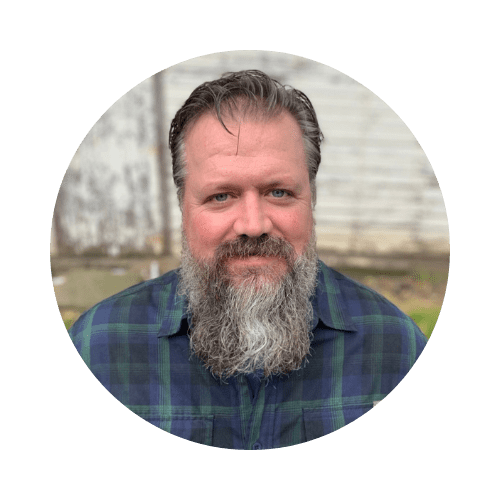
Jason Lief lives in Sioux Center, Iowa and works for the National Immigration Forum as a Bibles, Badges, and Business Immigration Mobilizer.
Email: jlief@bbbimmigration.org
Image Before Immigrant
Earlier this year, for the first time on record, the number of forcibly displaced people in the world hit 100 million. What that means is that one in every 78 people on Earth is displaced from their home as a result of war, violence, famine, and human rights violations each day.
We’ve welcomed over 3,500 refugees into our Quad Cities neighborhood since 1999. And as a member of that neighborhood, an employee at World Relief Quad Cities, and as a Christian, that number is staggering. It’s heart-breaking.
A few things come to mind as I reflect on that number. The first is that, when we talk about the 100 million, we’re not just talking about a number, we’re talking about people. These are men, women, boys and girls – of all ages, of many different races, and of incredible individual journeys that we, as Christians, are called to engage with (Matt. 25:31-45).
This is the challenge for us, as Christians, when it comes to resettlement: to put a human face on the number, first and foremost. Otherwise, the problem has a much harder time affecting us personally, and a much easier time remaining out of sight, out of mind, and certainly not right here in the middle of our communities.
These 100 million aren’t just people “over there,” either.
While many refugees do live “over there” – across oceans in refugee camps waiting to move on to a place like America where they and their families can be safe – many of them also live right here (or soon will live right here). And I don’t just mean in the country. I mean, here in the Cities – in your neighborhood.
I believe that, as pastors and Christians in the Quad Cities, we have an important question to ask ourselves: What will we do today and in the future as an incredible opportunity to fulfill our Matthew 25 and 28 mandates sits in our own backyards?
Most importantly, though, when I think of these people, I’m reminded that they each carry something they received long before they were called “immigrant” or “refugee.”
“So God created man in His own image,
in the image of God He created Him; male and female
He created them.”
(Gen. 1:27)
The fact of the matter is that from the very beginning, God set in motion a pattern of imbedding every person that would be with a dignifying status – His own image.
Because of this, we should be reminded that when it comes to people – wherever they’re from – it’s personal to God. No amount of cultural differences, languages, national borders, or miles between us have ever diminished this certitude.
Pastors, since moving here in April I’ve had the joy of sitting down with you and talking about what God is doing in the Quad Cities, and I’ve shared with you how I believe immigrants and refugees are an integral piece of that movement among us.
Today, I want to challenge you (along with myself) with three things.
- Let’s get face-to-face. Let’s sit down with refugees and enjoy a meal together and take the time to hear their stories and to learn about their experiences with the goal in mind of being like Jesus who ate many meals with many people very different than Him. World Relief QC is here to walk alongside, and I promise it will fill you with much joy.
- Let’s impact our neighborhood. I challenge you to talk to your churches about serving the neighborhoods these refugees live in – areas like Century Woods in Rock Island. At the end of the day, doing so isn’t just filling a need or showing kindness to the foreigner among us, it’s fulfilling the Great Commission right here, right now.
- Let’s see them as image-bearers before seeing them as immigrants. When we look to immigrants and refugees in our neighborhood, let’s think and speak of them as “fearfully and wonderfully made” before the word “foreigner” crosses our minds and mouths.
I believe in the Quad Cities and its capacity to continue welcoming the foreigner and the stranger in our midst. But even more, I believe in what God is doing here, both through your churches and through our office. Would you consider partnering with us through prayer and service to bring Christ’s love to the nations in our neighborhood?
Blessings to you, today.
Feeling inspired to get involved? Schedule a conversation with Spencer. Or, request a guest speaker at an upcoming event.
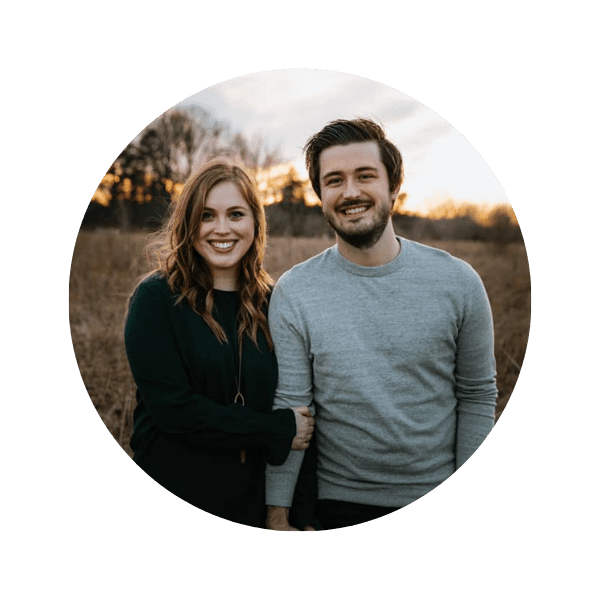
Spencer Conner is the Church Mobilizer at World Relief Quad Cities. He is originally from Atlanta, GA and has served as a Student Pastor in several churches between North Carolina and Kentucky over the past decade. Spencer is married to Beth, World Relief Quad Cities’ Community Engagement Manager, and they live in Davenport, IA with their golden retriever, Tuck.
Welcoming in Muscatine: Pascal
WRQC has partnered with Muscatine to assist with Ukrainian refugees and launch its first pilot office. For Pascal, this opens a world of opportunities.
Work that Hits Home
Pascal Ramadhani is Congolese, but has never lived in the Democratic Republic of Congo. He was born in Tanzania. His family fled the war in Congo a generation before. Soon after his birth, his family moved to a refugee settlement in Tanzania where they lived for twelve years.
The entire family was able to immigrate to the U.S. when Pascal was thirteen. They settled in Glen Ellyn, IL, later moving to Moline. Pascal finished high school at United Township High School and then attended the College of DuPage for two years before he had to go to work to help support his family.
WRQC hired Pascal as a caseworker in summer 2021. The work, assisting refugees from a variety of countries, quickly became Pascal’s life passion.
Helping Muscatine Welcome
In June 2022, the Muscatine Rotary Club invited WRQC Executive Director Laura Fontaine to speak at a meeting. She brought along two of her staffers, one of which was Pascal Ramadhani.
After the meeting, Dr. Naomi DeWinter, president of Muscatine Community College, invited Laura and her two staff members to tour the college. In the course of conversation, Pascal mentioned that it was a lifelong dream of his and his mother’s to finish a college degree.
One thing led to another. Pascal is now living in Muscatine and has begun classes at MCC. He continues his work as a case worker at World Relief, but his eye is on the prize: a college degree.
A Welcome to Muscatine Potluck was held at Trinity Episcopal Church on Friday, September 9, to honor Pascal, Ketsia Faraja, and the Luka family from Ukraine.
Donations for Pascal, Ketsia, the Lukas and other new arrivals may be made to the Community Foundation of Muscatine’s World Relief Muscatine County Fund and sent to Community Foundation of Greater Muscatine, 104 West Second Street, Muscatine, IA 52761.
Direct volunteer help will be welcome in the form of friendship, introduction to Muscatine services and amenities, shopping expeditions and other assistance.
For more information, contact Ric Smith at stceciliason@machlink.com or leave a message at 563 272-1646.
Written by Ric Smith
Welcoming in Muscatine: Ketsia
WRQC partnered with Muscatine to assist with Ukrainian refugees and launch its first pilot office – it also become a place of refuge for Ketsia.
Time Running Out
On August 25th, Ric Smith received a phone call from Laura Fontaine, WRQC Executive Director. One of Fontaine’s former interns, Ketsia Faraja, desperately needed a place to live. A mistake in paperwork had delayed Ketsia’s visa extension.
Ketsia is from South Kivu Bukavu in the Democratic Republic of Congo. She had just finished her degree at Augustana College in International Business and Political Science and secured a job with the International Relief Committee in Chicago.
She applied for a visa extension to work for two years here in the States, but the extension was denied. Then, she had to re-apply, and the process will take up to 90 days.
Finding Refuge in Muscatine
Suddenly, Ketsia’s plans were thrown off course. She found herself without a place to live. Never having been a refugee, Ketsia became an accidental refugee of tangled bureaucracy.
She made contact with her former employer at WRQC, Laura Fontaine. Laura had been working with a group in Muscatine for several months to resettle immigrants. She called Ric Smith, who then reached out to several people in the Muscatine group who had offered housing. The response was quick and gracious. Within 24 hours, Ketsia was able to move into an apartment in Muscatine.
Ketsia will be in Muscatine until her visa extension comes through and she can move to Chicago to work for the IRC.
Muscatine residents were invited to a welcome potluck on Friday, September 9. That evening, Muscatine officially welcomed Ketsia along with the Luka family from Ukraine and Pascal Ramadhani.
Written by Ric Smith











